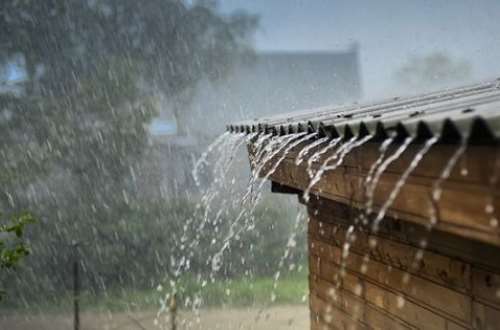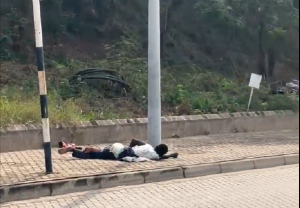The Ghana Meteorological Agency (GMET) is cautioning the public to be on high alert as its forecast suggests increased rainfall accompanied by strong winds in the coming weeks, particularly in the northern zone.
GMet revealed this during the National Workshop on Floods and Drought Early Warning, organised by the Water Resources Commission in Accra.
The workshop aimed to share and improve the results of flood and drought simulations in the Volta Basin.
Key issues discussed included early warning systems to help stakeholders implement measures to reduce the impact of flooding and drought, especially in communities along the Volta Basin that experience sea-level flood situations.
Speaking to JoyNews’ Rejoice Semefa Kpesu, a senior meteorologist at the Public Weather Office, Joshua Asamoah, stated his outfit had earlier communicated that the onset of the rainy season would be characterised by strong winds accompanying the rainfall.
However, he said the positive aspect behind the occurrence is that the strong winds accompanying the rains will help reduce the possibility of flooding in many localities.
“The good thing is that it has its positives and negative aspects. When the strong winds come along with the heavy rainfall, you have a lot of trees falling and all of that, and it also comes with this havoc.
“But the rainfall accompanying that heavy windstorm, the accumulation is not that high. So any time you have strong winds accompanying rainfall, the amount of rain that comes with it is a bit lower but when the rains come with little wind, they are able to stay for a long period of time and pour for a long period of time,” he said.
He emphasised that most of the strong winds for the southern parts of the country have already occurred because we are entering into the peak period of the rainy season.
“During the peak, they are not really accompanied by that heavy wind. So we get to July, then we’ll get a break somewhere in August. I guess we’ll be getting cloudy conditions in September, October and November – we will go back to another season for Southern Ghana, which will also come with strong winds and then heavy rainfall.
“But for people in the northern portions, they are now going to experience their strong winds because they are now going into their rainfall season,” he added.
Mr Asamoah suggested that the best approach during signs of rainfall is for people to seek shelter immediately.
“People, I think whenever they see clouds gathering, they want to rush and get to their homes. Sometimes even school children are left to go home when they see clouds gathering.
“It’s the worst decision you can ever take. So just keep them in a place where you think they are safe. In the event it should happen and it’s done, you can now release them to go. Flowing water has a very good strength to carry anything that comes in its path,” he advised.
On his part, the Public Relations Officer of the National Disaster Management Organization (NADMO), George Ayisi, said measures are being put in place to mitigate the expected effects.
“We’re prepared, we’ve had our men undergone training, watermanship, and adversaries training for a quick response. Our search and rescue team operations [have] prepared themselves to respond adequately because Ghana Meteo has also been giving us the update on the forecast they have and so we are well in the knowledge of how the situation is going to be this year, and we are ready to respond adequately and appropriately to it,” he said.
Mr Ayisi noted that his outfit has been cautioning people to stay away from places where there are a lot of trees, and should pay heed to their weather forecasts or warnings by the Ghana Meteo.
“If you are leaving the house and you get the weather warning and you’re going to areas that have many trees, try as much as possible to avoid such places and when you are within those places and the storm is coming, you need to move away from those places as quickly as you can,” he advised.










Discussion about this post